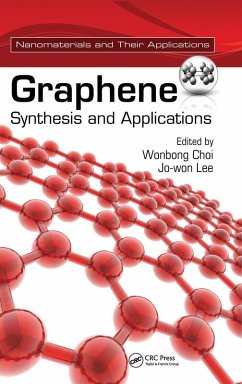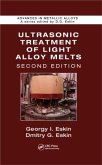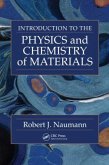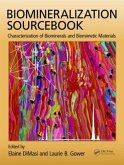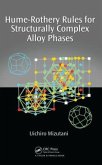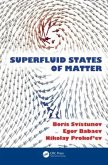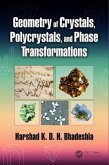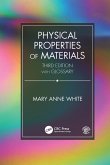Graphene
Synthesis and Applications
Herausgeber: Choi, Wonbong; Lee, Jo-Won
Graphene
Synthesis and Applications
Herausgeber: Choi, Wonbong; Lee, Jo-Won
- Gebundenes Buch
- Merkliste
- Auf die Merkliste
- Bewerten Bewerten
- Teilen
- Produkt teilen
- Produkterinnerung
- Produkterinnerung
Because of its exceptional electronic and optoelectronic properties, graphene has the potential to become an important material in next-generation electronic and energy applications. This authoritative volume discusses the synthesis, properties, and potential applications of graphene, including in electronic, sensor, energy, and display technologies. Suitable for researchers and graduate students, it provides a cohesive, critical review of graphene nanoscience and technology, offering valuable insight into how this material is made and used.
Andere Kunden interessierten sich auch für
![Ultrasonic Treatment of Light Alloy Melts Ultrasonic Treatment of Light Alloy Melts]() Georgy I EskinUltrasonic Treatment of Light Alloy Melts358,99 €
Georgy I EskinUltrasonic Treatment of Light Alloy Melts358,99 €![Introduction to the Physics and Chemistry of Materials Introduction to the Physics and Chemistry of Materials]() Robert J NaumannIntroduction to the Physics and Chemistry of Materials231,99 €
Robert J NaumannIntroduction to the Physics and Chemistry of Materials231,99 €![Biomineralization Sourcebook Biomineralization Sourcebook]() Biomineralization Sourcebook265,99 €
Biomineralization Sourcebook265,99 €![Hume-Rothery Rules for Structurally Complex Alloy Phases Hume-Rothery Rules for Structurally Complex Alloy Phases]() Uichiro MizutaniHume-Rothery Rules for Structurally Complex Alloy Phases242,99 €
Uichiro MizutaniHume-Rothery Rules for Structurally Complex Alloy Phases242,99 €![Superfluid States of Matter Superfluid States of Matter]() Boris V SvistunovSuperfluid States of Matter242,99 €
Boris V SvistunovSuperfluid States of Matter242,99 €![Geometry of Crystals, Polycrystals, and Phase Transformations Geometry of Crystals, Polycrystals, and Phase Transformations]() Harshad K D H BhadeshiaGeometry of Crystals, Polycrystals, and Phase Transformations116,99 €
Harshad K D H BhadeshiaGeometry of Crystals, Polycrystals, and Phase Transformations116,99 €![Physical Properties of Materials, Third Edition Physical Properties of Materials, Third Edition]() Mary Anne WhitePhysical Properties of Materials, Third Edition179,99 €
Mary Anne WhitePhysical Properties of Materials, Third Edition179,99 €-
-
-
Because of its exceptional electronic and optoelectronic properties, graphene has the potential to become an important material in next-generation electronic and energy applications. This authoritative volume discusses the synthesis, properties, and potential applications of graphene, including in electronic, sensor, energy, and display technologies. Suitable for researchers and graduate students, it provides a cohesive, critical review of graphene nanoscience and technology, offering valuable insight into how this material is made and used.
Produktdetails
- Produktdetails
- Verlag: CRC Press
- Seitenzahl: 394
- Erscheinungstermin: 11. Oktober 2011
- Englisch
- Abmessung: 239mm x 150mm x 23mm
- Gewicht: 680g
- ISBN-13: 9781439861875
- ISBN-10: 1439861870
- Artikelnr.: 32836143
- Verlag: CRC Press
- Seitenzahl: 394
- Erscheinungstermin: 11. Oktober 2011
- Englisch
- Abmessung: 239mm x 150mm x 23mm
- Gewicht: 680g
- ISBN-13: 9781439861875
- ISBN-10: 1439861870
- Artikelnr.: 32836143
Wonbong Choi is a professor in the Mechanical and Materials Engineering Department at Florida International University and an extraordinary visiting professor at WCU Department of Energy Engineering, Hanyang University. Choi was awarded the prestigious Materials Research Society (MRS) Medal in 2006 "for important developments in the materials science and applications of carbon nanotubes.", and the title of MRS fellow in 2009. One of the remarkable achievements in his research career was the invention of the Carbon Nanotube Field Emission Display, which was reported in Science and was covered extensively by news media around the world. In addition, Dr. Choi is credited with developing the high-efficiency Li-ion battery based on carbon nanotubes, vertical CNT-Field Effect Transistor and CNT based non-volatile memory devices. Dr. Choi is the author/co-author of over 70 patents (granted or applied), four book chapters, over 100 journal papers, and over 50 conference proceedings. He has been invited to share his technological findings and know-how at many international conferences, and has served as a chair/committee member for several international meetings including IEEE-Nano, TMS-Nano symposium, US-Korea Nanoworkshop and US-Korea Micro and Nano integrated Systems. Jo-won Lee is a chair professor at Hanyang University. His fields of research are primarily nanoelectronics (CNT, nano-flash memory) with a variety of experiences such as magnetic recording media/head, high Tc superconducting films and devices, diamond thin films and devices. Prior to his current position, Prof. Lee was director of the National Program for Tera-level Nanodevices (2000-2010) and was a general manager and then a project manager at the Samsung Advanced Institute of Technology (1992-2000). He has been serving as an editor-in-chief of Korea Nanotechnology Annul and of Nanotechnology Glossary since 2003. He has served as Chair of NANO KOREA 2006, 2007, 2008 and 2009 Symposium Steering Committee, and served as a general chair of the IEEE-Nanotechnology Conference 2010. Dr. Lee has authored and co-authored 92 papers/proceedings and holds 48 patents. He was listed in Who's Who in the World (1994/1995 edition). He received an alumni special award from Hanyang university for his leadership in nanotechnology (December 2001) and David McFarland award from Penn State Chapter of ASM International (April, 2003) for his achievement on metallurgy. He was appointed as one of 2004 role models in science by Korea Science Foundation, Dong-Ailbo and Dong-A Science. Korean government gave him a national honor medal for his contribution to the advancement of nanotechnology in Korea (April 2006).
Tailoring the Physical Properties of Graphene. Graphene Synthesis. Quantum
Transport in Graphene-Based Materials and Devices: From Pseudospin Effects
to a New Switching Principle. Electronic and Photonic Applications for
Ultrahigh-Frequency Graphene-Based Devices. Graphene Thin Films for Unusual
Format Electronics. Nanosized Graphene: Chemical Synthesis and Applications
in Materials Science. Graphene-Reinforced Ceramic and Metal Matrix
Composites. Graphene-Based Biosensors and Gas Sensors. Field Emission and
Graphene: An Overview of Current Status. Graphene and Graphene-Based
Materials in Solar Cell Applications. Graphene: Thermal and Thermoelectric
Properties. Index.
Transport in Graphene-Based Materials and Devices: From Pseudospin Effects
to a New Switching Principle. Electronic and Photonic Applications for
Ultrahigh-Frequency Graphene-Based Devices. Graphene Thin Films for Unusual
Format Electronics. Nanosized Graphene: Chemical Synthesis and Applications
in Materials Science. Graphene-Reinforced Ceramic and Metal Matrix
Composites. Graphene-Based Biosensors and Gas Sensors. Field Emission and
Graphene: An Overview of Current Status. Graphene and Graphene-Based
Materials in Solar Cell Applications. Graphene: Thermal and Thermoelectric
Properties. Index.
Tailoring the Physical Properties of Graphene. Graphene Synthesis. Quantum
Transport in Graphene-Based Materials and Devices: From Pseudospin Effects
to a New Switching Principle. Electronic and Photonic Applications for
Ultrahigh-Frequency Graphene-Based Devices. Graphene Thin Films for Unusual
Format Electronics. Nanosized Graphene: Chemical Synthesis and Applications
in Materials Science. Graphene-Reinforced Ceramic and Metal Matrix
Composites. Graphene-Based Biosensors and Gas Sensors. Field Emission and
Graphene: An Overview of Current Status. Graphene and Graphene-Based
Materials in Solar Cell Applications. Graphene: Thermal and Thermoelectric
Properties. Index.
Transport in Graphene-Based Materials and Devices: From Pseudospin Effects
to a New Switching Principle. Electronic and Photonic Applications for
Ultrahigh-Frequency Graphene-Based Devices. Graphene Thin Films for Unusual
Format Electronics. Nanosized Graphene: Chemical Synthesis and Applications
in Materials Science. Graphene-Reinforced Ceramic and Metal Matrix
Composites. Graphene-Based Biosensors and Gas Sensors. Field Emission and
Graphene: An Overview of Current Status. Graphene and Graphene-Based
Materials in Solar Cell Applications. Graphene: Thermal and Thermoelectric
Properties. Index.

